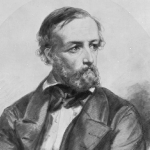Background
Paul Gustav Heinrich Bachmann was born on June 22, 1837 in Berlin, Germany. Bachmann’s father was Lutheran pastor at the Jacobi Kirche.

Humboldt University of Berlin, Berlin, Germany
Bachmann studied mathematics at the university of his native city of Berlin and received his doctorate in 1862 for his thesis on group theory.
University of Göttingen, Göttingen, Lower Saxony, Germany
In 1856 Bachmann went to the University of Göttingen so that he could continue to study courses by Lejeune Dirichlet who had just left Berlin to succeed to Gauss's chair in Göttingen.
Paul Gustav Heinrich Bachmann in his later years.








historian mathematician scientist scholars
Paul Gustav Heinrich Bachmann was born on June 22, 1837 in Berlin, Germany. Bachmann’s father was Lutheran pastor at the Jacobi Kirche.
During his early years in the Gymnasium he had some trouble with his mathematical studies, but his talent was discovered by the excellent teacher Karl Schellbach. After a stay in Switzerland for his health, presumably to recover from tuberculosis, Bachmann studied mathematics at the University of Berlin until he transferred to Göttingen in 1856 to attend Dirichlet’s lectures. Here he became a close friend of Dedekind, who was a fellow student. He completed his studies in Berlin, where in 1862 he received his doctorate under the guidance of Ernst Kummer for a thesis on group theory.
From 1856 on, Bachmann’s interests were centered almost exclusively upon number theory. Two years later after receiving his doctorate under the guidance of Ernst Kummer in 1862, he completed his habilitation in Breslau with a paper on complex units, a subject inspired by Dirichlet. After some years as extraordinary professor in Breslau, Bachmann was appointed to a professorship in Münster.
Around 1890 Bachmann divorced his wife and resigned his professorship. With his second wife he settled in Weimar, where he combined his mathematical writing with composing, playing the piano, and serving as music critic for various newspapers. His main project, however, was a complete survey of the state of number theory, Zahlentheorie. Versuch einer Gesamtdarstellung dieser Wissenschaft in ihren Hauptteilen (1892-1923). It includes not only a review of known results but also an evaluation of the various methods of proof and approach, labors for which his close association with Dirichlet, Kummer, Dedekind, and Hensel made him ideally suited.
He died on March 31, 1920 at the age of 82 in Weimar, Germany.
Bachmann`s most important work is a complete survey of number theory giving both the results and an evaluation of the methods of proof. Versuch einer Gesammtdarstellung dieser Wissenschaft in ihren Hauptteile, which he worked on after resigning his chair in Münster, was published in five volumes between 1892 and 1923.
In his religious affiliation Paul Bachmann was a Lutheran because of a strong influence of his father who was a minister. It is from his home the young Paul inherited a pious Lutheran view of life.
Bachmann`s personality coupled with modesty and a great interest in music. Paul was brought up in a strict home where his modest nature was encouraged, and where he became an enthusiastic and highly talented musician.
Physical Characteristics: Early in his life he suffered from tuberculosis but managed to recover.
Paul Gustav Heinrich Bachmann was married twice. He divorced his first wife in 1890, and after marrying his second wife, he settled in Weimar.
Johann Bachmann had been born in Drossen, Prussia, the son of the Lutheran minister Christian Friedrich Bachmann.




